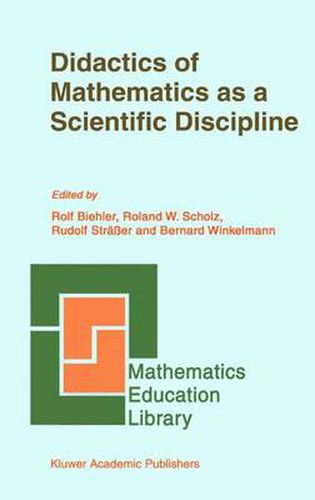Readings Newsletter
Become a Readings Member to make your shopping experience even easier.
Sign in or sign up for free!
You’re not far away from qualifying for FREE standard shipping within Australia
You’ve qualified for FREE standard shipping within Australia
The cart is loading…






This title is printed to order. This book may have been self-published. If so, we cannot guarantee the quality of the content. In the main most books will have gone through the editing process however some may not. We therefore suggest that you be aware of this before ordering this book. If in doubt check either the author or publisher’s details as we are unable to accept any returns unless they are faulty. Please contact us if you have any questions.
Didactics of Mathematics as a Scientific Discipline describes the state of the art in a new branch of science. Starting from a general perspective on the didactics of mathematics, the 30 original contributions to the book, drawn from 10 different countries, go on to identify certain subdisciplines and suggest an overall structure or “topology’ of the field.
The book is divided into eight sections: (1) Preparing Mathematics for Students; (2) Teacher Education and Research on Teaching; (3) Interaction in the Classroom; (4) Technology and Mathematics Education; (5) Psychology of Mathematical Thinking; (6) Differential Didactics; (7) History and Epistemology of Mathematics and Mathematics Education; (8) Cultural Framing of Teaching and Learning Mathematics.
Didactics of Mathematics as a Scientific Discipline is required reading for all researchers into the didactics of mathematics, and contains surveys and a variety of stimulating reflections which make it extremely useful for mathematics educators and teacher trainers interested in the theory of their practice. Future and practising teachers of mathematics will find much to interest them in relation to their daily work, especially as it relates to the teaching of different age groups and ability ranges. The book is also recommended to researchers in neighbouring disciplines, such as mathematics itself, general education, educational psychology and cognitive science.
$9.00 standard shipping within Australia
FREE standard shipping within Australia for orders over $100.00
Express & International shipping calculated at checkout
This title is printed to order. This book may have been self-published. If so, we cannot guarantee the quality of the content. In the main most books will have gone through the editing process however some may not. We therefore suggest that you be aware of this before ordering this book. If in doubt check either the author or publisher’s details as we are unable to accept any returns unless they are faulty. Please contact us if you have any questions.
Didactics of Mathematics as a Scientific Discipline describes the state of the art in a new branch of science. Starting from a general perspective on the didactics of mathematics, the 30 original contributions to the book, drawn from 10 different countries, go on to identify certain subdisciplines and suggest an overall structure or “topology’ of the field.
The book is divided into eight sections: (1) Preparing Mathematics for Students; (2) Teacher Education and Research on Teaching; (3) Interaction in the Classroom; (4) Technology and Mathematics Education; (5) Psychology of Mathematical Thinking; (6) Differential Didactics; (7) History and Epistemology of Mathematics and Mathematics Education; (8) Cultural Framing of Teaching and Learning Mathematics.
Didactics of Mathematics as a Scientific Discipline is required reading for all researchers into the didactics of mathematics, and contains surveys and a variety of stimulating reflections which make it extremely useful for mathematics educators and teacher trainers interested in the theory of their practice. Future and practising teachers of mathematics will find much to interest them in relation to their daily work, especially as it relates to the teaching of different age groups and ability ranges. The book is also recommended to researchers in neighbouring disciplines, such as mathematics itself, general education, educational psychology and cognitive science.